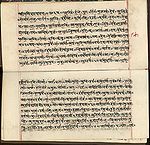- Comparative religion
-
For the Community episode, see Community (season 1)#ep12.
Comparative religion is a field of religious studies that analyzes the similarities and differences of themes, myths, rituals and concepts among the world's religions. Religion can be defined as the human beliefs and practices regarding the sacred, numinous, spiritual and divine.[1]
In the field of comparative religion, the main world religions are generally classified as Abrahamic, Indian or Taoic. Areas of study also include creation myths and Humanism.
Contents
Abrahamic religions
Main article: Abrahamic religionIn the study of comparative religion, the category of Abrahamic religions consists of the three monotheistic religions, Christianity, Islam and Judaism, which claim Abraham (Hebrew Avraham אַבְרָהָם ; Arabic Ibrahim إبراهيم ) as a part of their sacred history. Other religions (such as the Bahá'í Faith) that fit this description are sometimes included but are often omitted.[2]
The original belief in the One God of Abraham eventually became present-day Judaism. Christians believe that Christianity is the fulfillment and continuation of the Jewish Old Testament, with Jesus (Hebrew Yeshua יֵשׁוּעַ) as the messiah of Old Testament prophecy and subsequent New Testament teachings and continued prophecy. Islam believes the present Christian and Jewish scriptures have been modified over time and are no longer the original divine revelations as given to Moses, Jesus, and other prophets. For Muslims the Qur'an is the final revelation from God—Final Testament, with Muhammad as his messenger for its transmission.
Comparing Abrahamic religions
See also: Judeo-Christian, Supersessionism, People of the Book, Tahrif, Biblical narratives and the Qur'an, and Judeo-Islamic philosophies (800 - 1400)Christianity and Judaism are two closely related Abrahamic religions that in some ways parallel each other and in other ways fundamentally diverge in theology and practice. The article on Judeo-Christian tradition emphasizes continuities and convergences between the two religions. The article on Christianity and Judaism compares the different views held by both religions.
The historical interaction of Islam and Judaism started in the 7th century CE with the origin and spread of Islam. There are many common aspects between Islam and Judaism, and as Islam developed, it gradually became the major religion closest to Judaism. As opposed to Christianity which originated from interaction between ancient Greek and Hebrew cultures, Judaism is very similar to Islam in its fundamental religious outlook, structure, jurisprudence and practice.[3] There are many traditions within Islam originating from traditions within the Hebrew Bible or from postbiblical Jewish traditions. These practices are known collectively as the Isra'iliyat.[4]
The historical interaction between Christianity and Islam connects fundamental ideas in Christianity with similar ones in Islam. Islam and Christianity share their origins in the Abrahamic tradition, although Christianity predates Islam by centuries. Islam accepts many aspects of Christianity as part of its faith - with some differences in interpretation - and rejects other aspects. Islam believes the Qur'an is the final revelation from God and a completion of all previous revelations, including the Bible.
Indian and Indo-European religions
Main articles: Indian religions, Vedic Brahmanism, Proto-Indo-Iranian religion, and Proto-Indo-European religionThe term "Indian religions" refers to a number of religions that have originated on the Indian subcontinent tracing their origins through Proto-Indo-Iranian religion ultimately to Proto-Indo-European religion. They encompass Hinduism, Buddhism, Jainism, and Sikhism.
Other largely extinct Indo-European religions closely allied to the Indian religions, sharing a common history, include Zoroastrianism, ancient Greek, Celtic, Roman, Hittite, Slavic and Norse mythology.[citation needed]
Comparing "Dharmic" religions
 The Rig Veda is one of the oldest Vedic texts. Shown here is a Rig Veda manuscript in Devanagari, early nineteenth century.
The Rig Veda is one of the oldest Vedic texts. Shown here is a Rig Veda manuscript in Devanagari, early nineteenth century. Main article: Buddhism and HinduismFurther information: Buddha as an Avatar of Vishnu, Gautama Buddha in world religions, and God in Buddhism
Main article: Buddhism and HinduismFurther information: Buddha as an Avatar of Vishnu, Gautama Buddha in world religions, and God in BuddhismBuddhism and modern Hinduism are both post-Vedic religions. Gautama Buddha is mentioned as an Avatar of Vishnu in the Puranic texts of Hinduism. Some Hindus believe the Buddha accepted and incorporated many tenets of Hinduism in his doctrine, however, Buddhists disagree and state there was no such thing as Hinduism at the time of Buddha and in fact, "Indeed, it absorbed so many Buddhist traits that it is virtually impossible to distinguish the latter in medieval and later Hinduism."[5] Prominent Hindu reformers such as Gandhi[6] and Vivekananda[7] acknowledge Buddhist influence. Gandhi, like Hindus, did not believe Buddha established a non-Hindu tradition. He writes, "I do not regard Jainism or Buddhism as separate from Hinduism."[8]
Taoic religions
Main article: East Asian religionsA Taoic religion is a religion, or religious philosophy, that focuses on the East Asian concept of Tao ("The Way"). This forms a large group of religions including Taoism, Confucianism, Jeung San Do, Shinto, Yiguandao, Chondogyo, Chen Tao and Caodaism. In large parts of East Asia, Buddhism has taken on some taoic features.
Tao can be roughly stated to be the flow of the universe, or the force behind the natural order. It is believed to be the influence that keeps the universe balanced and ordered and is associated with nature, due to a belief that nature demonstrates the Tao. The flow of Ch'i, as the essential energy of action and existence, is compared to the universal order of Tao. Following the Tao is also associated with a "proper" attitude, morality and lifestyle. This is intimately tied to the complex concept of De, or literally "virtue" or "power." De is the active expression of Tao.
Taoism and Ch'an Buddhism for centuries had a mutual influence on each other in China, Korea and Vietnam. These influences were inherited by Zen Buddhism when Ch'an Buddhism arrived in Japan and adapted as Zen Buddhism.
Comparing Taoic religions
- Taoism and other religions
- East Asian Buddhism
Comparing traditions
Further information: Eastern religions, Western religions, prehistoric religion, religions of the Ancient Near East, Proto-Indo-Iranian religion, and Proto-Indo-European religionBahá'í Faith
- Bahá'í Faith and other religions
- Bahá'í Faith and Buddhism
- Bahá'í Faith and Hinduism
- Bahá'í Faith and Zoroastrianism
Buddhism
- Bahá'í Faith and Buddhism
- Buddhist–Christian Studies
- Buddhism and Christianity
- Buddhism and Eastern religions
- Buddhism and Gnosticism
- Buddhism and Hinduism
- Buddhism and Jainism
- Buddhism and Theosophy
- Parallels between Buddha and Jesus
Christianity
- Christianity and other religions
- Buddhism and Christianity
- Buddhist–Christian Studies
- Christianity and Islam
- Christianity and Judaism
- Christianity and Neopaganism
- Christianity and Paganism
- Christianity and Vodou
- History of Hindu–Christian Encounters, AD 304 to 1996
- Parallels between Buddha and Jesus
Hinduism
- Hinduism and other religions
- Ayyavazhi and Hinduism
- Bahá'í Faith and Hinduism
- Buddhism and Hinduism
- Hinduism and Islam
Islam
- Islam and other religions
- Christianity and Islam
- Hinduism and Islam
- Islam and Jainism
- Islam and Judaism
- Islam and Sikhism
- Mormonism and Islam
Jainism
Mormonism
Paganism and Neopaganism
Sikhism
Taoism
- Taoism and other religions
Zoroastrianism
See also
- Comparative mythology
- Hierographology
- Inclusivism
- Institute for Interreligious Dialogue
- Interfaith
- List of religions
- Panbabylonism
- Patternism
- Religious pluralism
References
- ^ "Human beings' relation to that which they regard as holy, sacred, spiritual, and divine" Encyclopædia Britannica (online, 2006), cited after What is Religion? Definitions and Quotes.
- ^ Why Abrahamic? Lubar Institute for the Study of the Abrahamic Religions at the University of Wisconsin
- ^ Rabbi David Rosen, Jewish-Muslim Relations, Past and Present, November 2003
- ^ Rabbi Justin Jaron Lewis, Islam and Judaism, October 2001
- ^ MLA style: "monasticism." Encyclopædia Britannica. 2007. Encyclopædia Britannica Online. 14 Aug. 2007 <http://www.britannica.com/eb/article-38700>.
- ^ “owes on eternal debt of gratitude to that great teacher,”Mahatma Gandhi and Buddhism Y.P. Anand An Encounter with Buddhism http://www.iop.or.jp/0414/anand.pdf
- ^ He is the ideal Karma-Yogi, acting entirely without motive, and the history of humanity shows him to have been the greatest man ever born; beyond compare the greatest combination of heart and brain that ever existed, the greatest soul-power that has ever been manifested. Essay, Ideal Karma Yogi http://www.webcitation.org/query?url=http://www.geocities.com/Athens/Olympus/5208/karmayoga/ideal.html&date=2009-10-25+06:08:15
- ^ P. 17 Gandhi By Ronald Terchek
Further reading
- Eastman, Roger (1999) The Ways of Religion: An Introduction to the Major Traditions. Oxford University Press, USA; 3 edition. ISBN 978-0195118353
External links
- Patheos.com's Side-By-Side Comparative "Lenses"
- 2nd International Online-Conference "Comparative Religion: from Subject to Problem"
- ReligiousTolerance.org
- Academicinfo.net
- ReligionFacts.com
- Comparative-religion.com
- Studies in Comparative Religion
- Answers to Questions of Faith From Several Worldviews
- Study of Comparative Religions in Indian Universities
Categories:- Religious comparison
Wikimedia Foundation. 2010.


